
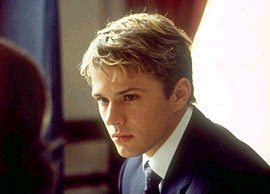
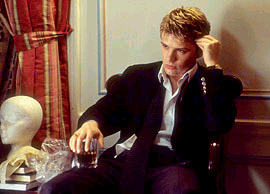
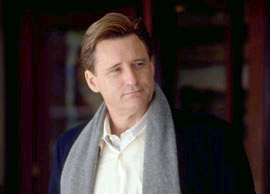
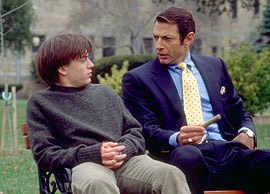
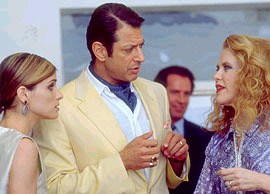
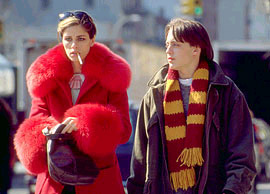
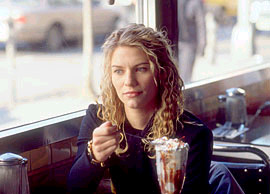
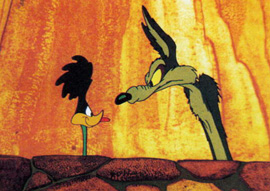
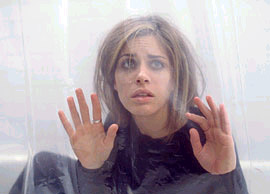












|
Igby Goes Down (2002) 


Warning: This review is going to have a lot of stupid little side jokes, which are going to break up the flow and cause a lot of tonal inconsistency. I will shift from serious analysis to silly antics like a mad cow strung out on Tristam Shandy. You will wonder whether I am truly clever or just 'thinks he is' like my high school yearbook says. In the end, you will either like it or hate it. I know I do.
Igby Goes Down is a good film, but its real value will probably be as a tool for understanding how and why certain film critics like and dislike films.1 Basically, Igby is what would happen if Rushmore were actually a remake of The 400 Blows directed by Peter Greenaway's son. The screenplay was good although there's been some debate over this. By movie standards, there's nothing out of control, just good, solid drama. Girls punching boys. Boys caught with their pants down. Girls with no pants at all. Glass breaking. People breaking. People slumping in heaps. But it moves from day-to-day (realism) to over-the-top drama (not real) often with no obvious pattern. And Steers makes excellent use of Bill Pullman in stark contrast to the misuse of Michael Douglas we suffered in Traffic. The scene where Igby watches his father suffer a mental breakdown talking about 'the pressure' weighing down on him. It reminded me of Bunuel's Discreet Charm where the young boy speaks with the ghost of his mother. And this would be enough to fuck any kid up. In short, the film is not perfect vis-ŕ-vis auteur theory. [this next line is going to look like it was written by William Saffire after he's had a few] But there are plenty of humor pearls, drama diamonds, sapphires of set design, turquoise twists and realism rubies. The film may ultimately be shallow, but it's nowhere near as contrived as American Beauty. I think people without chips (of jade) on their shoulder can enjoy this film in spite of its flaws.
Dialogue not too bad. They said many of the things clever people say in real life, and you think, "damn, that was clever. That could have been in some movie." Well? "Why do you just say I'm funny and not laugh?" Yes, that is something some people do, but actually, you're supposed to say a particular remark or joke is funny. It's on a per thing basis, not simply "you're funny," which is just sort of annoying. But Clare Danes was annoying in this film.
Speaking of sucking dicks, Ed Park (Village Voice) has his panties in a bunch because Igby's lines aren't as clever as we're supposed to think they are. You know, maybe he's right. Maybe Igby isn't as clever as he's supposed to be. Or maybe that isn't the point. Although much of the plot and nearly all the screen time centers around Igby, the film is more about the other characters and how they deal with him. Aside from his several Rushmorian lines, he is actually a rather passive foil to the real focus, which is, as I said, girls punching boys, boys punching boys, people taking tips with unsettling ease, and girls being girls getting it on with better looking boys in ways that could only culminate in what was obviously Steers' unconscious tribute to Amores Perros. 'Ven conmigo, ven conmigo' ('come with me, come with me not my stinking brother'). When the older brother walks away and says, 'you're a glutton for it,' it recalls the crumpled cruelty and ensueing tantrum in the orange-haired girlfriend dumping scene in Fallen Angels.
And there are plenty of interesting characters, who are compelling even if underdeveloped. Susan Saran Wrap is first rate. And she's not just the classic 'super bitch' or 'well-acted bitch' you saw in some other movie. No. She is, as proven toward the end, acutely aware of the her own bitch, the irony of her dysfunctional life, and even the plight of her fucked up kids. Because of this, her character is truly novel, so novel that we almost overlook the way her final plan works as an utterly brilliant plot device. Igby is like a less subtle version of Harold in Harold and Maude. That seventies psychiatrist (boys punching boys) was totally a doppelganger for Cat Stevens. That scene also helped me to recognize something I too had been suppressing. It made me realize how good it would feel to smack the entire cast of that 70's show.
New paragraph. The triangle between the kid, heroin girl and Jeff Goldblum re-accomplishes much of what Tarantino did with Travolta, Uma and Marsellus Wallace in Pulp Friction. Yet it added the comfortingly benevolent bisexual to the mix. And even his psycho girl/boyfriend demonstrated in true Manhattan style that the triangle doesn't really ever stop. Each person connects to another person and then another, and sooner or later, one of those people sells drugs. And your old art teacher really does order up coke to her loft on W. 15th street. I can't believe I almost forgot about that.
As for the symbolism, Antonioni may not be looking over his shoulder just yet, but it is pretty decent for a first time director. The comfort of an ice cream sundae is the reassurance that some girls do actually still want to be friends, even if they say they don't at first. The theme of reassurance is given a twist as it comes in the form of a heroin junkie crash landing on your toilet. We find comfort knowing our junkie friend will always come back sooner or later even if it's for the wrong reasons. Perhaps it's familiarity or simply need rather than fidelity or any sort of self-renewing bonds, which drive friendships. If we then reexamine the ice cream friendship, we have to at least ask if it's really that different from heroin girl. I know my answer. I'd take the heroin chick in a heartbeat. I would just have to remember to wear a jimmy hat. And just in case I might get drunk and forget, I would tape some onto myself, or maybe just sew a pocket in my underwear and keep one in it. Um, what has happened here? Jeff Goldblum, as always, packs a solid punch and looks great in a suit. But remember in Rushmore when Jason Schwartzman says 'O.R. they?' Well do you? Because it's identical to when they're in the restaurant, and Culkin says 'what would that be, beware of schizophrenia?' Same scene. Judgment for plaintiff.
This movie has little to do with The Graduate as The New York Times has suggested, other than superficial plot similarities and the nice tribute scene where he walks through the party in the Hamptons. Wait, damn, I wanna be as rich as Jeff Goldblum in this movie. Wait, or Jeff Goldblum not in this movie. Damn. But The Graduate comparison, like the New York Times, is useful in some ways. Stubborn runt Dustin Hoffman receives seduction of hot, washed up Anne Bancroft and pursues hot, Berkeley girl Katharine Ross in same film. Meanwhile, runt Culkin is mounted by heroin girl (hot and washed up) and later lies with existential Bennington girl. I can't remember if [Peet] put her hand over his mouth while she fucked him, but if not, she should have.
Whereas The Graduate stays focused on this basic, simple storyline, Igby throws in the brother, the mother, the godfather, the father and just makes everything more complicated. The New York Times suggests the lack of a happy ending will keep the film from achieving Graduate status. The film will not achieve Graduate status, but it's not because of the ending. The ending was well done and appropriate. Instead, we should be asking whether the film will achieve Rushmore status. And what it comes down to is the question of cool or contrived. I suspect that over time, many of the people who were moved at first will be moved back on further viewings. I do want it to be cool because I want more cool films like Bush wants peace. In times like these, it's often best to reserve judgment until the next film comes out. We'll find out whether Burr Steers has something to say, or if he just wants to slap on a song from the next Coldplay's album for Igby Goes Down Again: This Time It's Personal. I will wait. True love waits.
Here is a list of entertaining comments by various critics:"Culkin exudes none of the charm or charisma that might keep a more general audience even vaguely interested in his bratty character." — William Arnold, SEATTLE POST-INTELLIGENCER
"Even Culkin’s intensely mordant performance here can’t make this pointless and brutal film watchable." — MaryAnn Johanson, FLICK FILOSOPHER
"A mean-spirited film made by someone who surely read The Catcher in the Rye but clearly suffers from dyslexia" — Erik Childress, EFILMCRITIC.COM
Culkin broods and freaks out ably, but Igby's snotty, dysfunction-derived malaise remains off-putting, mostly because his lines aren't half as clever or empathic as Steers would believe." — Ed Park, VILLAGE VOICE
1 This review was originally going to be written by Jean Luc-Godard, but he quit the project when he was not allowed to change 'why certain film critics like and dislike films' to 'why certain film critics try to date each others' wives.'
Tattle Tale: The two field hockey girls fighting was stolen from Airplane with the two girl scouts in the bar.
Tattle Tale You: When I said 'same scene. Judgment for plaintiff', that was actually copying a similar joke I saw in the great legal thriller 'Harvery Birdman, Attorney At Law'.
And One More Thing: If you thought this movie was good, try the real thing, Murmur of the Heart (1971).